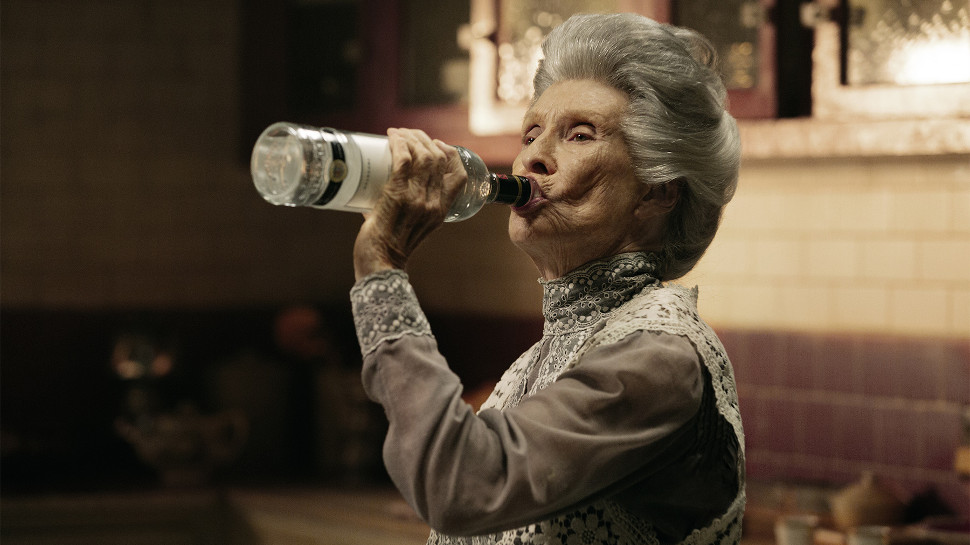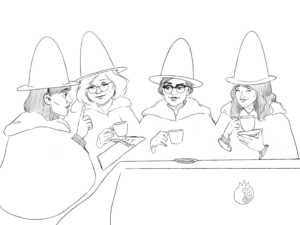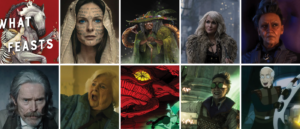Disclaimer: This review contains spoilers for American Gods Episode 2. It was written with readers of the American Gods novel in mind. If you read the book, nothing here should come as much of a surprise to you, even if you haven’t watched the show. If you haven’t read the book or watched the episode, first, why are you here? But second, this probably isn’t where you want to be.
In American Gods Episode 2: The Secret of Spoons, Shadow doesn’t encounter many spoons, but he does encounter a few contemporary American Gods: namely, mass media, dick pics, and racism. Between Anansi’s powerful opening monologue to Czernobog’s “casually racist white uncle at a dinner party” self-satisfaction, this episode presents some truly challenging content. But then the scene shifts and two characters start arguing over who can say the word “fucking” the loudest. The camera slowly zooms in on an inanimate object, which then turns into an excessive amount of rock-hard boners.
Because we’re in CableTown now, motherfuckers. Like a staff of collegiate comics artists sneaking things past their editor, American Gods revels in throwing as many f-bombs and wieners at the viewer as it can.
“The Secret of Spoons” opens on a Dutch slave ship, as one man desperately prays to the spider-god Anansi to set him free. Anansi, spectacularly portrayed by Orlando Jones, shows up in a snappy power-clashing plaid suit and monologues with the force of 10 Ian McShanes. Anansi warns the ship’s unwilling passengers about the racism awaiting them in the Americas, and the haunting centuries of white supremacy awaiting their descendants (though, admittedly, the news isn’t all bad: the tobacco they’ll be forced to pick will “give a shitload of white motherfuckers cancer” down the line). He encourages the slaves to set the ship ablaze — better to sacrifice yourself for something meaningful and take your enemies down with you, right?

In this episode’s post-credits “behind the scenes” featurette, the writers mention that Anansi’s character really took shape after Jones collaborated with them about his portrayal. Jones’ recommendations on Anansi’s style, delivery, and cadence make him the series’ most striking character so far.
Racism — but more specifically, oppressive whiteness — is a recurring theme throughout the episode. A little farther in, Shadow references his literal lynching at the hands of the white startup god from last week’s episode — “Strange fucking fruit,” he yells at Wednesday, who is far too busy trying to fuck a teen in a shady hotel to care that the employee he’s been aggressively recruiting is two steps away from death’s door. And towards the end of the hour, Slavic deity Czernobog, part of a dark/light pantheon dichotomy, asks Shadow if he’s black. “I was like the black man over there,” Czernobog cackles, sinking into his role as a creepy death god / patron saint of casually racist white uncles everywhere. (Every character within earshot facepalms.)

It feels important to note that the American Gods novel is a lot of things, but it’s primarily a British author’s love-letter to roadside Americana. Some readers criticize the way that Book-Shadow’s racial ambiguity allows Gaiman to sidestep handling the lived experiences of people of color in America more directly — aside from the way many characters ask the eternally patient Book Shadow “what he is” with varying levels of condescension. TV Show Shadow has a clear racial identity, which forces the show to address issues Gaiman didn’t tackle in the novel. And by addressing the lynching semi-subtext from the previous episode, American Gods refuses to hide behind weakass “uh, uh, uh, we didn’t mean that; god don’t u know who ODIN??? Is???” decontextualized nerd bullshit.
So in short, it’s not all bad.
However, I am truly baffled by a lot of aspects of American Gods, but especially baffled by its pacing. After our interlude with Anansi, a good deal of the show’s real estate is devoted to watching Shadow clean and pack up the home he shared with Laura. Slow-moving scenes like this one seem designed to evoke emotion, tension or suspense in theory, but in practice, we just spend a lot of time watching Shadow seal his belongings in packing tape or watching Bilquis absorbing more poor, unfortunate souls into her Business at the same speed in which empires rise and fall.
American Gods tends to play up the series’ motifs to an exaggerated degree, so the focus on Bilquis and her terrifying-yet-magical vagina is no exception. “You like that?” the show asks, poking you square in the chest. “Well here are five more people getting stuffed into a vagina.” At the same time, we get a few poignant moments with Bilquis to reflect on what she’s lost in the ages since her believers left her behind. This is one of the few slow-paced scenes that really work within this episode.
Motifs aren’t the only thing American Gods spends too much time with. The show seemingly wants you to perceive Shadow/Wednesday dialogue as banter, but almost every conversation between them consists of both parties repeating each others’ lines at increasing volume. These conversations tend to go down like this:
Shadow: Why the FUCK is this FUCKING FUCKED thing FUCKING happening? I am a stoic grieving man for fuck’s sake.
Wednesday: Why the FUCKING FUCK indeed!
Shadow: That’s what I said! What the FUCKING FUCK, you FUCK!
Wednesday: [Feels Himself; talks to himself for three minutes without pausing; grins smugly, waggles eyebrows at the viewer]
Shadow: [screams internally]
So while Ian McShane continues to perfectly embody Wednesday as a character, this only reinforces how fucking (FUCKING!) insufferable Wednesday actually is. Plus, instead of punctuating the dialogue with impact, the repetitious exchanges drag many of the already awkwardly paced scenes far past the average viewer’s capacity to give a fuck (FUCK!).
I long for the spooky and strangely intimate roadtrip feeling of the American Gods novel. I didn’t want to see Lucy’s tits, but I especially didn’t want to see them in a brightly lit Costco — even though Gillian Anderson’s cameo was a welcome reprieve from large swathes of the episode dedicated to Shadow packing up his home in real time. In the book, Shadow encounters Media in the privacy of his hotel room. This feels more like an invasion, to have pop culture get its hooks into you while you’re making a conscious effort to avoid and ignore it. In the show, Media’s confrontation with Shadow utilizes the neat visual effect of making a whole bunch of TVs do some spooky shit they shouldn’t be able to do, but lacks the sheer discomfort and revulsion as the book managed to convey.

On the plus side, this episode ends with Shadow and Wednesday meeting Czernobog and his sisters, and we get to spend plenty of time with Superb Crone Zorya Vechernyaya — an elderly deity who drinks vodka straight from the bottle and laps up Wednesday’s compliments while dragging him the whole time. Would that we could all unapologetically dump our bad cooking on obnoxious acquaintances and declare that learning is beneath us.

However, if we want this show at its Zorya Vechernyaya, we have to accept it at is Czernobog, a character who spends his entire 20 minutes on screen competing with Wednesday to see who can give the longest self-absorbed monologue.
So many scenes in this episode left me with more questions than answers, but not in a “wow, what a spooky mystery this all is” way. Did the Russian Pantheon stuff really need to spill into the next episode, considering how much of this one was about Shadow taping up boxes? How many hours of self-satisfied boasting will we need to sit through before this is all over? Will we ever care about Laura, like, at all, or do we just need to accept that this show only sees her as a dead whore? (Shoutout to Wednesday, who tells Shadow just how bad he’s allowed to feel about his wife’s death, considering that she “died with [his] best friend’s coccckkkkkk in her mouth.”)
At this point, I feel like the only reviewer who isn’t wholeheartedly enjoying the Great American Gods Roadtrip. Then again, I’m also one of the only people I know that hated the film adaptation of Neil Gaiman’s Stardust. Stardust always struck me as a book about realizing that your life might not work out the way you hoped it would, but that’s okay — the film spends more time revelling in the Extremely Neil Gaiman weirdness of it all but reduces the characters to the simplest possible versions of themselves. I’m getting a similar vibe from characterization in American Gods, and I’m missing the charm and nuance I remember from the book. Maybe I’m the kind of Book Nerd who will always mistrust adaptations and inflate the positive qualities of its source material. Maybe this mistrust is what’s really limiting my enjoyment, rather than the subject matter. But either way, this episode leaves me feeling real FUCKING conflicted. Here’s hoping that Episode Three can offer us a better look at the characters’ inner lives, a bit more Charm Of The Open Road, and a significant reduction in boners. I won’t hold my breath, nor my vagina.




